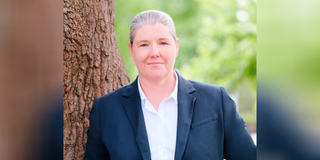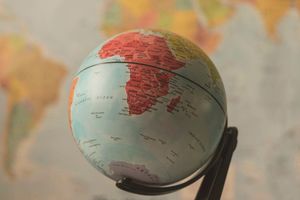Q&A with Amanda McClelland: Nurses were key in turning around the 2014 Ebola outbreak

Amanda McClelland, Senior Vice President of Prevent Epidemics at Resolve to Save Lives.
Amanda McClelland is the senior vice-president for Prevent Epidemics at Resolve to Save Lives, where she leads a team working to make the world safer from the next epidemic while also responding to Covid-19.
Following the West Africa Ebola epidemic and the imminent threat of a major infectious disease, Ms McClelland’s team partnered with low- and middle-income countries to step up their preparedness.
When she fought Ebola, she served in Sierra Leone, Liberia and Guinea.
Ms McClelland is a notable expert in epidemic response and preparedness.
She spoke to senior health and science reporter Angela Oketch on the vulnerability of frontline workers, how to respond to infectious diseases and what she learnt from attending to Ebola patients.
What is essential for nurses today in our global response to the pandemics, more so in Africa? What do you think governments should mostly focus on?
Nurses play a central and critical role in the global response to pandemics, often serving as the first point of contact with a person who has a notifiable disease that can spur a potential outbreak.
Nurses are also often involved throughout the entire process of clinical care, from early detection to caring for patients and families, which puts nurses at the centre of communities and builds trust.
Governments should focus on the shortage of nurses. Gaps in the nursing workforce represent gaps in a community’s ability to confront and stop pandemics.
Also Read: How Africa can prevent the next pandemic
Additionally, we must all work to protect healthcare workers by ensuring they have the right equipment to protect themselves and their communities, not only from infection but also from mental health challenges and burnout.
Take us through your daily life while you were battling Ebola. What were some of the thoughts that you had then, and where do you think there were lapses?
On a typical day battling Ebola, the first and primary concern was the safety of the staff. We had more than 6,000 volunteers working either in safe and dignified burial teams or inside the Ebola treatment units.
So, the first thought was always their health safety. We prioritised checking on them both mentally and physically.
When I first arrived, 54 nurses died in the hospital that we were supporting within the first two weeks. After that, we lost one nurse in the next 18 months.
And while one nurse is too many, this showed me that putting in the right controls and the right processes can make it safe to manage and support Ebola patients.
Second, we focused on the patients. It was very difficult providing care, in very tough environments, wearing heavy PPE and working in outdoor hospitals.
So, it was hard for the staff as well as for the patients. We focused on ensuring that we could provide the highest quality care in the safest possible way.
And our third priority was connecting with families and communities. We made sure that they understood how their family members were doing while they were in the Ebola treatment centre, and shared information and updates with them regularly.
We tried to maintain continuous communication with the community to help them understand that Ebola is a frightening disease and requires a lot of behaviour change.
Most healthcare workers are mentally disturbed after battling viruses. Did you get the necessary support you needed? What do you think can be done to support the frontline workers, some of the countries that have done well in this sector and what the rest can learn from them?
Nurses, clinicians, and other healthcare workers have already explained to governments that they need better protection and more staff.
One of the hardest things with burnout is knowing that you are covering for more patients than you can manage. I think the hardest thing for a nurse is finishing a shift, knowing that you haven't provided the best level of care.
And often, that's because you're trying to manage too many patients without enough resources. So staffing ratio is extremely important, ensuring that nurses have the equipment they need to be able to provide care safely. And then being able to have time off and salaries to meet their needs.
One of the biggest stresses I've seen, especially in Africa and which I also went through, is nurses who aren't getting paid regularly and are forced to choose between feeding their families and looking after their own needs, and their commitment to their patients.
For nurses to lead, it’s based on a commitment and conviction to self, it’s not about money, but it’s about what we believe in, saving humanity. What are your thoughts on this?
Nurses and healthcare workers in general tend to care about patients and they want to help people. But it's not either or, everyone needs money to survive, and no one is providing healthcare work for free.
You have your own needs and your family's needs. And so, we take advantage sometimes of those service-oriented professions.
It’s the same for police and for teachers, the people who serve are often the lowest paid in our communities. We take advantage of their willingness and their commitment to serve.
So, I think we need to adequately pay community health workers, nurses, clinicians, and other people that provide support to the communities across a range of activities.
The vulnerability of frontline healthcare workers is a story that's been told many times during the pandemic and other outbreaks over the last 100 years. What are the lessons we've learned that can help tackle future pandemics?
When we look at outbreaks or epidemics that didn't happen, what we see is one of the biggest points of success are the astute clinicians and frontline nurses who can identify a problem and know how to protect themselves and their communities.
They are able to notify the correct authorities about the problem and activate a surveillance system. We describe it as clinicians with a high level of suspicion.
Nurses, clinicians, and frontline workers, who are thinking about outbreaks, looking for patterns of diseases and making sure that they're identifying them through a surveillance system are critical in successfully preventing outbreaks.
Countries are not prepared for disease pandemics. What did you learn from the Ebola and Covid-19 crisis that would help in ironing out some of the issues brought about by pandemics?
The two taught us that we needed a unified and seamless approach to disease surveillance and reporting, which includes rapid pathogen detection, immediate communication of its threat to the appropriate authorities, and the activation of a response plan as quickly as possible.
Pulling from some of my experiences and others, the model we have developed at Resolve to Save Lives is known as 7-1-7 – countries must identify a public health threat or pathogen within seven days, communicate the threat to their public health authorities within one day, and complete an initial response plan within seven days.
In addition, we still need to improve access to data and fix data gaps. We must strengthen community engagement, provide better protection for our healthcare workers and improve communication.
These fixes take time, money and resources to put into place.
Nurses were key in turning around the 2014 Ebola outbreak in West Africa. However, in the end, they paid with their lives because of the shortage of supplies, weak healthcare infrastructure, and the lack of effective therapies or vaccines. What can be done differently?
We must protect our nurses and healthcare providers at all costs because not only are they putting their lives and their families’ lives on the line, but also because they are the backbone of our healthcare system and our primary line of defense against existing and new disease outbreaks.
For starters, we must ensure that all nurses and frontline staff are provided with the necessary personal protective equipment (PPE), and they need to feel confident that it works.
Next, we have to provide frontline workers with the resources that they need to do their jobs – that includes medical equipment, vaccines, etc., but it also means access to new and evolving information surrounding a new outbreak, connections within the community to share and receive important information, and overall, a level of trust from the government and from within the community.
The work and insight of nurses are often not considered when policymakers gather to consider preparedness and response. What is your advice to policymakers?
We need to make sure that nurses have a seat at the table. Policymakers must identify those key stakeholders that are driving change in public health and include them in conversations and key decision-making.
Nurses not only make up 70 percent of the healthcare workforce, but they also help us to translate community needs into the healthcare system and the other way around.
They're critical stakeholders and we need to invite them to conversations, make room for them to contribute and create pathways for them to be able to share their voices.
As a result, we've started an advocacy training programme for frontline nurses so that they can speak up on behalf of themselves and their patients, because they do play a critical role.
What have we learned from past and current outbreaks? What are the proven best practices that can be implemented to stop future epidemics in their tracks before they spiral out of control?
Best practices in outbreak or epidemic prevention come down to doing the simple things well and consistently.
We need to engage with communities, we need to be able to identify when an infectious disease is starting. We need to be able to notify the system when a threat is detected, and we need to respond quickly.
And if we do those things consistently and well, we prevent outbreaks from occurring.
How can investments in preparedness and response systems help with future epidemics?
We need to invest not just in health systems to respond to big events like Covid-19.
But we need continuous investment in health systems to battle everyday events that countries are facing like malaria, tuberculosis, the measles outbreaks that we're seeing right now, and cholera, among others.
We need to invest in good quality primary health care so that communities know where they can access health care and for everyday health concerns.
And that will help to build trust in the community and start to form those foundations to be able to prevent outbreaks in the future.
How can countries get ahead of infectious diseases?
It is important to recognise that infectious disease threats are inevitable, but outbreaks are preventable.
Making sure that we're investing in those frontline healthcare systems, primary healthcare, and being able to find outbreaks quickly and respond quickly, is how we get ahead of infectious diseases and make sure that epidemics don't happen. Too often we focus on the things that went wrong.
And there's a lot to learn from the things that went wrong. Our recently released “Epidemics That Didn't Happen” report is a moment to celebrate the success that every day frontline healthcare workers and public health systems are finding and controlling outbreaks.
So, we hope this helps shine a light on those bright spots, because there are a lot. We need to invest in what's working well, and how we can scale that and do it more consistently.





